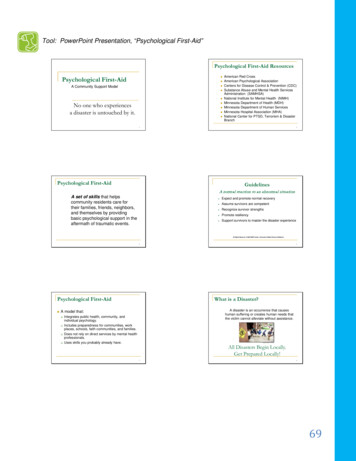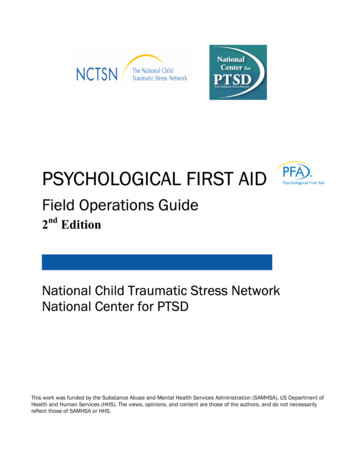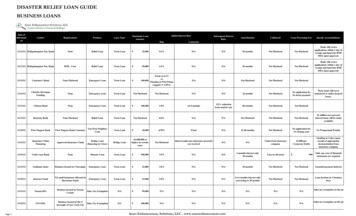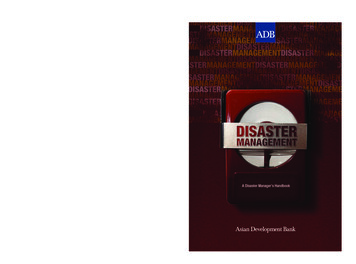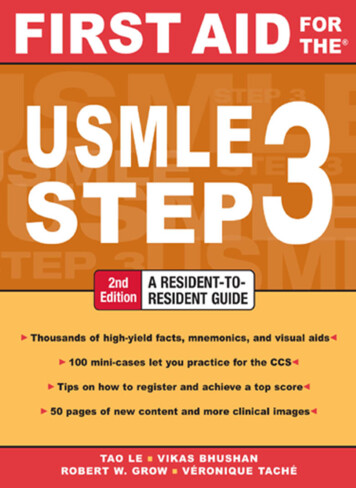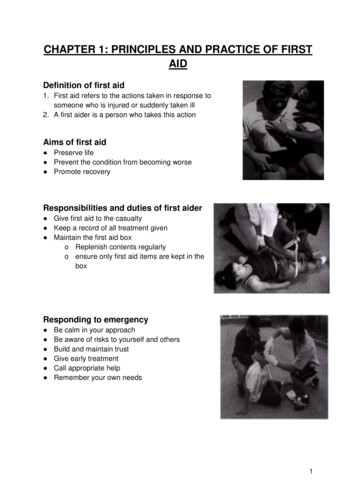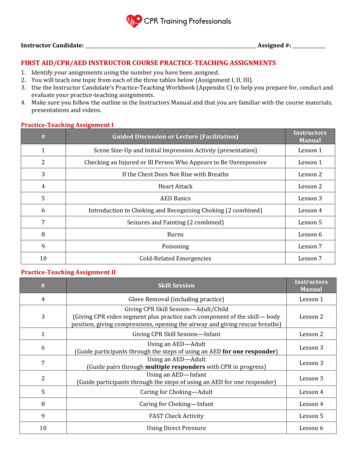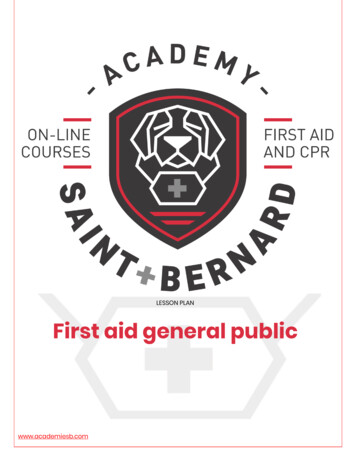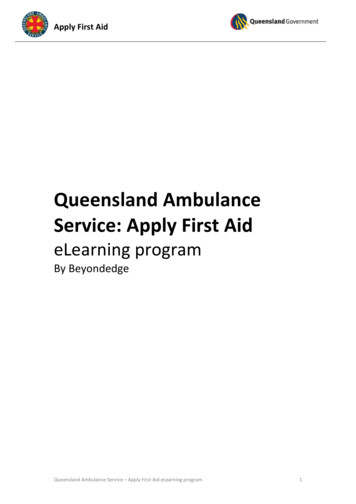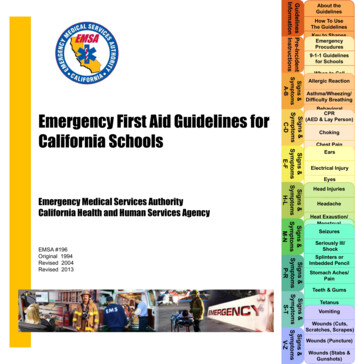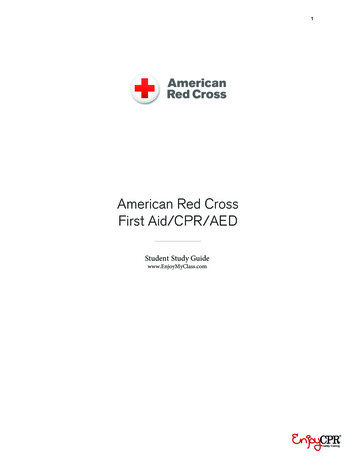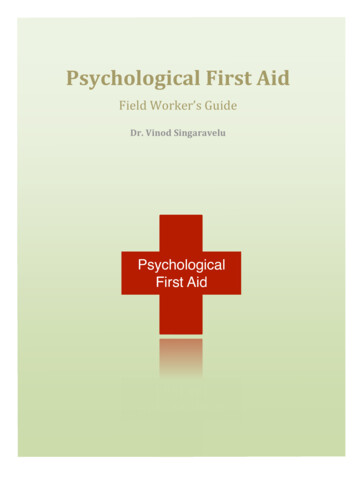
Transcription
Psychological First AidField Worker’s GuideDr. Vinod SingaraveluPsychologicalFirst Aid
Psychological First Aid: Field workers GuideForewordThis guide was developed in order to have widely agreed upon psychologicalfirst aid material for use in developing countries. The material included in thisguide is compiled from various internationally approved references mentionedat the end of this booklet. The author, Dr. Vinod Singaravelu, has brought therelevant information in a comprehensive format for easy understanding andtraining purposes. The author does not claim ownership of the information inthis material. The author is willing for this material to be used, as necessary fornon‐commercial purposes, by the field workers or to train them to deliverPsychological First Aid in disaster situation.For Feedback or questions, please contact:Dr. Vinod Singaravelu MBBS, MRCPsych. Oxford, UK.Child & Adolescent Psychiatrist and Resilience Life Coach,Vinod.Singaravelu@yahoo.comTel: 44‐7950585367Special Thanks toDr. Leslie Scarth FRCPsych, Edinburgh, UK, andDr. Renuka Abimannan MBBS, DA. Oxford, UK, for their timely help in the processof creating this useful resource.1
Psychological First Aid: Field workers GuideContentWhat is Psychological First Aid (PFA)?Page37 Themes3What it is NOT?43 helpful factors for long‐term recovery4Who is PFA for?People who need special attention & Support55When & Where is PFA provided?8How is PFA provided?9Who delivers it?10Good Communication10Ethical Do’s & Don’ts11Preparation143 Action Principles – Look, Listen & Link14People who need special attention19Take care of yourself22Manage Your Stress22Rest and Reflect23Points to Remember24References & Resources272
Psychological First Aid: Field workers GuideWhat is Psychological First Aid (PFA)?PFA is a humane, supportive response to a fellow human being whois suffering and who may need support. It is an acute intervention ofchoice when responding to the psychosocial needs of children, adultsand families affected by disaster and terrorism. It is designed toreduce the initial distress caused by traumatic events and to fosterimmediate and long term adaptive functioning and coping.It involves the following 7 themes:3
Psychological First Aid: Field workers GuideWhat it is NOT?Psychological First Aid is NOT Psychological debriefing NOT obtaining details of traumatic experiences and losses NOT treating NOT labeling or diagnosing NOT counseling NOT something that only professionals can do NOT something that everybody who has been affected by anemergency will need.It is not useful, and may be harmful, to ask a disaster survivor tosystematically recount their perceptions, thoughts and emotionalreactions during a recent stressful event.3 helpful factors for long term recovery:Feeling safe,calm &connected toothersRecoveryAccess tosupport4Feeling ableto helpthemselves
Psychological First Aid: Field workers GuideWho is PFA for?PFA does not assume that all survivors will develop severe mentalhealth problems or long‐term difficulties in recovery. Instead, it isbased on an understanding that disaster survivors will experience abroad range of early reactions (eg. physical, psychological,behavioural, or spiritual) Some of these reactions might causeenough distress to interfere with adaptive coping and their recoverymay be helped by PFA.PFA is for distressed people who have been recently exposed to aserious crisis event. It involves people of all ages, including children.Do not force help on people who do not want it, but make yourselfeasily available to those who may want support.People who need special attention & support (At Risk Population): People with serious life‐threatening injury need emergencymedical care People who are too upset that they cannot care for themselvesor their children People who may hurt themselves People who may hurt others Children & Adolescents – particularly those separated fromtheir caregivers – need protection from abuse and exploitation. People with health conditions or mental and physicaldisabilities – take them to a safe place, protect them fromabuse, help them access medical care & other services – this5
Psychological First Aid: Field workers Guideincludes elderly people, pregnant women, severe mentaldisorder, or people with visual or hearing difficulties People at risk of discrimination or violence – eg. women orpeople of certain ethnic groups, may need special protection tobe safe in the crisis setting. People with substance abuse problems Mothers with babies and small children Those with significant loss of possessions (home, family etc) Those exposed first hand to grotesque scenes or extreme lifethreat.People may react in various ways to a crisis. Some examples ofdistress responses to crisis are: Physical symptoms – eg. Shaking, headaches, feeling very tired,loss of appetite, aches and pains Crying, sadness, depressed mood, grief Anxiety, fear Being ‘on guard’ or ‘jumpy’ Worry that something really bad is going to happen Insomnia, nightmares Irritability, anger Guilt, shame (eg. having survived, or for not helping or savingothers) Confused, emotionally numb, or feeling unreal or in a daze Appearing withdrawn or very still (not moving) Not responding to others, not speaking at all Disorientation (eg. not knowing their name, where they arefrom or what happened)6
Psychological First Aid: Field workers Guide Not being able to care for themselves or their children (eg. noteating or drinking, not able to make simple decisions)Most people will recover well over time, especially if they can restoretheir basic needs and receive appropriate support and PFA.Make sure that severely distressed people are not left alone andtry to keep them safe until the reaction passes or until you can findhelp from health personnel, local leaders or other communitymembers in the area.7
Psychological First Aid: Field workers GuideWhen & Where is PFA provided?PFA is aimed at people who have been recently affected by a crisisevent. You can provide PFA when you first have contact with verydistressed people. This is usually during or immediately after anevent.PFA is designed for delivery in diverse settings. You can provide PFAin shelters, field hospitals, camps, acute care facilities (emergencydepartments), respite centers for first responders or other reliefworkers, crisis hotlines, feeding locations, family reception andassistance centers, homes, businesses, schools, evacuation centersand other community settings.Ideally try to provide PFA where you can have some privacy to talkwith the person when appropriate. Privacy is essential forconfidentiality and to respect the person’s dignity, for those whohave been exposed to certain types of crisis events such as sexualviolence.8
Psychological First Aid: Field workers GuideHow is PFA provided?Basic objectives: Establish a human connection in a non‐intrusive,compassionate manner Enhance immediate and ongoing safety, and provide physical &emotional comfort Calm and orient emotionally overwhelmed or distraughtsurvivors Help survivors to tell you specifically what their immediateneeds & concerns are, and gather additional information asappropriate Offer practical assistance and information to help survivorsaddress their immediate needs and concerns Connect survivors as soon as possible to social supportnetworks, including family members, friends, neighbours, andcommunity helping resources. Support adaptive coping, acknowledge coping efforts andstrengths, and empower survivors; encourage adults, children,and families to take an active role in their recovery Provide information that may help survivors cope effectivelywith the psychological impact of disasters Be clear about your availability, and (when appropriately) linkthe survivor to another member of a disaster response team orto local recovery systems, mental health services, public‐sectorservices, and organizations. Calm people, reduce distress, make people feel safe and secure Help people understand the disaster and its context9
Psychological First Aid: Field workers Guide Help people identify own strengths and abilities to cope; andfoster belief in people’s ability to cope. Give hope. Assist with early screening for people needing further orspecialized help Get people through the first period of high intensity anduncertainty. Set people up to be able to naturally recover from an event Reduce the chance of PTSD (Post Traumatic Stress Disorder)Who delivers it?PFA should be delivered by appropriate agencies as part of state,regional/district or local emergency management plans. Responsescan be undertaken in a coordinated manner, and the psychosocialsupport can be provided as a key part of the emergency response.This could include: health & allied health professionals, volunteers,teachers, members of clergy & other faith‐based organization, RedCross volunteers and other trained responders from communityorganization & local government staff. Most people responding to anemergency are able to provide this type of assistance, comfort andsupport to people in distress.Good CommunicationAt times of distress people who have been through a crisis event maybe very upset, anxious or confused. Good communication is vital atthese times. Stay calm and show understanding of the situation andtheir experience. Be open to listen to someone’s story but do not10
Psychological First Aid: Field workers Guideforce them to tell you. Keep your language simple; communicate wellwith words and body language appropriate to their culture, age,gender, religion and custom. Always be considerate and Respectful ofdisaster survivors and follow the below Ethical Do’s and Don’ts.Do’sDon’tsBe honest and trustworthyDon’t exploit your relationship asa helperBe aware of and set aside yourDon’t ask the person for anyown biases and prejudicesmoney or favour for helping themMake it clear to people that evenDon’t make false promises or giveif they refuse help now, they canfalse information. Don’tstill access help in the future.exaggerate your skillsBehave appropriately byDon’t force help on people, andconsidering the person’s culture,don’t be intrusive or pushy.age and gender.Find a quiet place to talk, andDon’t pressure someone to tellminimize outside distractiontheir storyRespect people’s right to makeDon’t interrupt or rushtheir own decisions.someone’s story (eg. don’t look atyour watch or speak too rapidly)Respect privacy and keep theDon’t touch the person if you’reperson’s story confidential if thisnot sure it is appropriate to do so.is appropriateStay near the person but keep anDon’t judge what they have orappropriate distance dependinghaven’t done, or how they areon their age, gender & culturefeeling. Don’t say: “You shouldn’tfeel that way” or “You should feellucky you survived”.11
Psychological First Aid: Field workers GuideLet them know you are listening:Don’t make up things you don’teg. Nod your head or say ‘hmm ’knowBe patient and calmDon’t use terms that are tootechnicalProvide factual information, ifDon’t tell them someone else’syou have it. Be honest about what storyyou know and don’t know. “Idon’t know, but I will try to findout about that for you”.Give information in a way theDon’t talk about your ownperson can understand – keep ittroublessimple.Acknowledge how they areDon’t think and act as if you mustfeeling and any losses orsolve all the person’s problemsimportant events they tell youfor them.about, such as loss of their homeor death of a loved one. “I’m sosorry. I can imagine this is verysad for you”Acknowledge the person’sDon’t take away the person’sstrengths and how they havestrength and sense of being ablehelped themselves.to care for themselvesAllow for silenceDon’t talk about people innegative terms (eg. don’t callthem ‘crazy’ or ‘mad’)Adapt your approach according to the cultural differences whilstpreparing for PFA.12
Psychological First Aid: Field workers GuideBe mindful of the Dress code; Language used to greet people and the language they speak Gender & Age – should affected women only be approached bywomen helpers? Power – Is there a family or community head who you need toapproach? Physical contact – Is touching appropriate to their custom? Arethere special things to consider in terms or behaviour aroundthe elderly, children, women or others? Religion & beliefs – What beliefs or practices are important tothe people affected? How might they understand or explainwhat has happened based on their religious or other beliefs? Limitations – both yours and theirs: eg. Language barrier, hardof hearing, mentally challenged, lack of education and agerelated developmental stage for children.o Use simple to understand language, avoid jargons,speak at the eye level of children, use other meansof communication if needed, use translators whenneeded, help the caregivers or parents who couldthen help their dependants.Example of how you may initially approach a family to introduceyourself and ask about their immediate needs:Towards Adult/Caregiver:Hello. My name is . I work with .I’m checking in with people to see how they are doing, and to see if I can help in anyway. Is it okay if I talk to you for a few minutes? May I ask your name? Mrs. Sharma,before we talk, is there something right now that you need, like some water or fruitjuice?13
Psychological First Aid: Field workers GuideTowards Adolescent/Child:And is this your daughter? (Get on child’s eye level, smile and greet the child, usingher/his name and speaking softly.)Hi Pooja, I’m and I’m here to try to help you and your family. Is thereanything you need right now? There is some water and juice over there, and we havea few blankets and toys in those boxesWell prepared is half done!Before entering a crisis site learn about the following [CSS]: Crisis event – What happened? When & where it took place?Who and how many people are likely to be affected? Support services – Who is providing the basic needs (food,water & shelter), emergency medical care and tracing familymembers? Where & how can people access those services?Who else is helping? Any community members involved? Safety concerns – Is the crisis over or continuing? Whatdangers may be in the environment (rebels, landmines ordamaged infrastructure)? Are there areas to avoid enteringbecause they are not secure or because you are not allowed tobe there?Once you are well prepared follow the 3 action principles of PFA.ACTION PRINCIPLESLOOK, LISTEN AND LINKLookListen143 ActionPrinciplesLink
Psychological First Aid: Field workers GuideLOOK:Check for safety, People with obvious urgent basic needs, and peoplewith serious distress reactions.Crisis situations can change rapidly. You may not have enough timeto prepare adequately or the scene may be different from what youlearned before you enter the site. Be calm, be safe and think beforeyou act. Consider following questions as you “look” around you:1. SAFETY: What dangers can you see in the environment (activeconflict, damaged roads, unstable building etc)? Can you bethere without likely harm to yourself or others?a. If you are uncertain about the safety then do not go. Tryto get help for people in need. If possible, communicatewith people in distress from a safe distance untilappropriate help arrives.2. BASIC NEEDS: Look for anyone critically injured and needimmediate emergency medical help? Does anyone seem toneed rescuing from being trapped or from immediate danger?Who needs urgent basic needs (food, water, shelter)? Whoneeds basic needs and special attention to be protected fromdiscrimination, abuse and violence? Who else around me needhelp?a. Know your role and your limits.b. Get help for people who need special assistance or whohave obvious urgent basic needs.c. Refer critically injured people to medical care/physicalfirst aid.3. SERIOUS DISTRESS REACTION: Are there anyone who isextremely upset, not able to move on their own, not responding15
Psychological First Aid: Field workers Guideto others, who might harm themselves or others or in shock?Where and who are the most distressed people?a. Prioritize accordingly and provide PFA; Do not leavethem alone, try to keep them safe until the reactionpasses or until you find help from health personnel orother community members in the area.LISTEN:Approach people who may need support. Ask about people’s needsand concerns. Listen to people and help them to feel calm. Follow theabove‐mentioned Do’s and Don’ts as a guide.1. Help them feel comfortable – eg. offer water2. Take them to a safer place3. Protect from exposure to the media for their privacy & dignity.4. Ask for their specific needs and concerns5. Help them work out what their priorities are.6. Stay close to the person7. Do not force them to talk but listen in case they want to talkabout what happened.8. Be a role model – Stay calm, speak slowly and help them feelcalm.a. If someone feels unreal or disconnected from theirsurrounding as a distress reaction, it may help them tomake contact with their current immediate environmentand themselves.For eg. Ask them to feel their feet on the floor, tap theirfingers or hands on their lap, notice some non‐distressing things in their environment (sound, vision,16
Psychological First Aid: Field workers Guideand feeling) Have them tell you what they see or hear.Encourage them to focus on their breathing and tobreathe slowly.LINK: (Major part of PFA)Help people address basic needs, access services and cope with theirproblems. Give them information of the crisis event, support servicesavailable, and how to seek help. Connect people with loved ones andsocial support. Make sure vulnerable or marginalized people are notoverlooked. Follow up with people if you promise to do so.Linking people with practical support is a major part of PFA. PFA isoften a short time and one time intervention. So help people to noticetheir strengths & help themselves and to regain control of theirsituation. Being able to manage a few issues will give the person agreater sense of control in the situation and strengthen their ownability to cope.Consider the following: Address basic needs & access services – eg. food, water, shelterand sanitation. Link people with specific services for special needs – motherwith young baby needing to be fed, health care concerns etc. Affirm people’s ability to cope with the current situation Give practical suggestions for them to meet their own needs Encourage people to use their ‘positive’ coping strategies – eg.Enough rest, spending time with family, adequate self care,17
Psychological First Aid: Field workers Guidedoing activities to relax, finding safe ways to help others in thecrisis. Discourage ‘negative’ coping strategies – eg. Taking illicitdrugs, alcohol or smoking; Sleeping all day; Working all thetime without rest; Isolated from friends and families; Selfneglect; engaging in violence, etc. Give information: There may be rumors in crisis situation.Might be useful to give information to the groups of affectedpeople so that everyone hears the same message.o Give information on the event, their families, their safety,their rights, and how to access support they need.o If you do not know all the information do not make upinformation or give false reassurance instead tell themthat you will find out about it and follow it through orguide them to the place/person where they can findthose information. Connect with loved ones and social supporto People with good social support after a crisis cope betterthan those who feel they were not well supported.o Linking people with loved ones and support is animportant part of PFA.o Keep families together and keep children with theirparents.o If prayers and religious practice helps someone link themwith their spiritual community.o Help bring affected people together to help each other.18
Psychological First Aid: Field workers GuidePeople who need special attention1. Children, including adolescents:o Crisis events often disrupt their familiar world (people,places and routine) that makes them feel secure.o They are at risk of sexual violence, abuse andexploitation (child trafficking/recruitment into rebelarmed forces etc)o Young children at particularly vulnerable as they cannotmeet their basic needs or protect themselves and theircaregivers may be overwhelmed by the crisis.o How children react to the crisis depends on their age anddevelopmental stage. It also depends on how theircaregivers cope and interact with them.o Children cope better when they have a stable, calm adultaround them.o Specific distress reactions: Young children: reoccurrences of earlier behaviour– eg. Bedwetting, cling to caregivers, or reducetheir play. School‐age children: may believe bad things mayhappen, develop new fears, feel alone, orpreoccupied with rescuing people in crisis Adolescents: may feel “nothing”, isolated fromfriends or risk taking behaviour and negativeattitudes.19
Psychological First Aid: Field workers Guideo Important first step is to reunite separated children,including adolescents, with their families. Try to linkimmediately with a trustworthy child protection agencythat can begin the process of registering the child andensuring they are cared for.o When they are with caregivers, try to support thecaregivers in taking care of their own children.o Listen to children’s view on their situationo Try to talk to them on their eye level and use words &explanations they can understand.o When safe to do so, support children to engage in playactivities or conversations about their interests ‐ helpswith relaxing and coping.o Allow adolescents to be sad. Don’t expect them to betough.o Encourage and allow opportunities for them to behelpful, but also support them and discuss how they canavoid being harmed.o Finding safe ways for them to contribute in the situationmay help them to feel more in control2. People with health conditions or physical or mentaldisabilities:o Basic PFA action principles applies here as well.o Get them to a safe place, connect with basic support andhealth care, and support them to take care of themselves.20
Psychological First Aid: Field workers Guideo Some health conditions needs special medical andpsychological care – high blood pressure, heart condition,asthma, anxiety and other mental disorders.o Pregnant women may experience severe stress from thecrisis that could affect the pregnancy.o People with limited mobility or sight or hearing will havedifficulties finding their family members or accessingsupport services.o Ensure they get their safety, basic needs and immediatehealth needs are met. Stay with them and make sure theyhave someone with them if you need to leave.o Consider linking them with a protection agency orrelevant support to help them in the longer term.o Give information on how to access any available services.3. People at risk of discrimination or violence:o These include – women, people from certain ethnic orreligious group, and people with mental disabilities. They may be overlooked when basic needs areprovided They may be left out of decisions about aid,services or where to go They may be targeted for violence including sexualviolence and exploitation.o They need special care to ensure their safety. Connectwith loved ones and give information on availableservices.Remember all people have resources to cope including those who arevulnerable. Help them use their own coping resources and strengths.21
Psychological First Aid: Field workers GuideTake care of yourselfYou can best get ready to be a helper in crisis situation by:1. Preparing well – learn about crisis situation, roles &responsibilities of different kind of helpers.2. Consider your own health – both physical and psychological.Learn to manage your stress and have a healthy balanced work& personal life habits.3. You cannot help everyone and at all the times. So make anhonest decision about whether you are ready to help in thisparticular crisis and at this particular time.MANAGE YOUR STRESS: Think what has helped you cope in the past and what you cando to stay strong. Take time to eat, rest and relax, even for short periods Keep reasonable working hours so you do not become tooexhausted. Work in shifts and take regular rest periods. People may have problems after the crisis event – eg. feelinginadequate or frustrated when you cannot help people with allof their problems. Remember, you are human too – you are notresponsible for solving ALL of people’s problems. Do what youcan to help people help themselves Avoid alcohol, caffeine or nicotine, if possible or at leastminimize them; Check your fellow helpers to see how they are managing andhave them check in with you.22
Psychological First Aid: Field workers Guide Find ways to support each other. Talk with friends, loved onesand people you trust for support.REST AND REFLECT: Take time to rest and reflect your experience. This is animportant part of ending your helping role. To help your own recovery:o Talk about your experience of helping in the crisissituation with a colleague or someone you trusto Acknowledge what you were able to do to help others,even in small ways.o Learn to reflect on and accept what you did well, whatdid not go very well, and the limits of what you could doin the circumstanceso Take some time, if possible, to rest and relax beforebeginning your work and life duties again.o Speak to a health care professional if you find yourselfstruggling to cope with the stresses from your role ashelper.23
Psychological First Aid: Field workers GuidePOINTS TO REMEMBER Politely observe first; don’t intrude. Then ask simple respectfulquestions to determine how you may help Often, the best way to make contact is to provide practicalassistance (food, water, blankets) Initiate contact only after you have observed the situation andthe person or family, and have determine that contact is notlikely to be intrusive or disruptive. Be prepared that survivors will either avoid you or flood youwith contact. Speak calmly. Be patient, responsive, and sensitive. Speak slowly, in simple concrete terms; don’t use jargons oracronyms. If survivors want to talk, be prepared to listen. When you listen,focus on hearing what they want to tell you, and how you canbe of help. Acknowledge the positive features of what the survivor hasdone to keep safe. Give information that directly addresses the survivor’simmediate goals and clarify answers repeatedly as needed. Give information that is accurate and age‐appropriate. When communicating through a translator or interpreter, lookat and talk to the person you are addressing, not at thetranslator or interpreter.24
Psychological First Aid: Field workers Guide Remember that the goal of PFA is to reduce distress, assist withcurrent needs, and promote adaptive functioning, not to elicitdetails of traumatic experiences and losses. Do not “debrief” by asking for details of what happened. Do not assume that everyone exposed to a disaster will betraumatized. Do not pathologize. Know the situation and prepare adequately before you enterthe crisis environment. Remember 3 Action Principles: LOOK – LISTEN – LINK Remember 7 Themes of PFA:o Provide practical care and supporto Assess needs and concernso Help people to address basic needso Listen but do not force them to talko Comfort and help them feel calmo Connect with services and informationo Protect people from further harm Remember certain people are more distressed or disabledneeding specific attention and special care. Respect people’s privacy and dignity. Maintain confidentiality. Follow the Ethical Do’s and Don’ts. Good communication is vital. When speaking to children speak to them at eye level, use age‐appropriate language. Support the caregivers to take care oftheir dependants. Help people to help themselves and to regain control of theirsituation. Remember that all people have resources to cope,including those who are vulnerable. Help vulnerable people to25
Psychological First Aid: Field workers Guideuse their own coping resources and strategies. This applies tochildren & adolescents too. People recover better when they feel they had good socialsupport. Link them with family & friends and available supportservices. Always keep children with their caregivers. If possible, explain to the person that you are leaving, when youfinish your role, and if someone else will be helping them fromthat point on, try and introduce them to that person. Remember, you are human too, so take care of yourself. Takeregular rest and reflect on your experience with your colleague.“PREPARE – LOOK – LISTEN – LINK – REST – REFLECT”26
Psychological First Aid: Field workers GuideReferences & Resources:Brymer, M, Jacobs, A, Layne, C, Pynoos, R, Ruzek, J, Steinberg, A et al (2006).Psychological First Aid: Field operations guide (2nd ed.) Los Angeles: NationalChild Traumatic Stress Network and National Centre for first‐aid ch‐first‐aid.aspBurke, S, Richardson, J (2009). Psychological First Aid: An Australian Guide.Crisis Care Commitment. Australian Psychological society and Australian RedCross. ��Agency Standing Committee (IASC) (2007). IASC Guidelines on MentalHealth and Psychosocial Support in Emergency Settings. Geneva: IASC.http://www.who.int/mental health psychosocial june 2007.pdfThe Sphere Project (2011) Humanitarian Charter and Minimum Standards inDisaster Response. Geneva. The Sphere Project.http://www.sphereproject.orgWorld Health Organization, War Trauma Foundation and World VisionInternational (2011). Psychological First Aid: Guide for field worke
Psychological First Aid: Field workers Guide 1 Foreword This guide was developed in order to have widely agreed upon psychological first aid material for use in developing countries. The m
